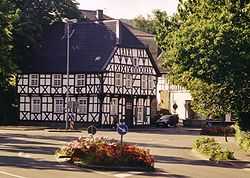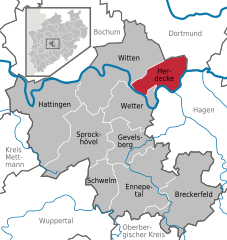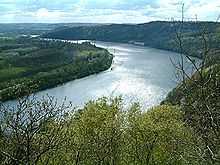Herdecke
| Herdecke | ||
|---|---|---|
 | ||
| ||
 Herdecke | ||
Location of Herdecke within Ennepe-Ruhr-Kreis district 
 | ||
| Coordinates: 51°24′N 07°26′E / 51.400°N 7.433°ECoordinates: 51°24′N 07°26′E / 51.400°N 7.433°E | ||
| Country | Germany | |
| State | North Rhine-Westphalia | |
| Admin. region | Arnsberg | |
| District | Ennepe-Ruhr-Kreis | |
| Government | ||
| • Mayor | Dr. Katja Strauss-Köster (Ind.) | |
| Area | ||
| • Total | 22.4 km2 (8.6 sq mi) | |
| Elevation | 274 m (899 ft) | |
| Population (2012-12-31)[1] | ||
| • Total | 22,754 | |
| • Density | 1,000/km2 (2,600/sq mi) | |
| Time zone | CET/CEST (UTC+1/+2) | |
| Postal codes | 58313 | |
| Dialling codes | 02330 | |
| Vehicle registration | EN | |
| Website | www.herdecke.de | |

Herdecke is a town in the district of Ennepe-Ruhr-Kreis, North Rhine-Westphalia in Germany. It is located south of Dortmund in the Ruhr Area and is known as Die Stadt zwischen den Ruhrseen (lit. The city between the Ruhr lakes).
The city is located in the area of the Regionalverband Ruhr (RVR). The two Ruhr lakes Hengsteysee and Harkortsee as well as the forests on the Ardey heights make the town attractive to tourists. The historic center with its many timbered houses and the 30 metre high Ruhr viaduct across the valley are two more landmarks.
Geography
Herdecke is located in the Ardeygebirge, the northwestern part of the Sauerland, between Dortmund in the North and Northeast, Hagen in the South, Wetter (Ruhr) in the Southwest and Witten in the West and Northwest. Herdecke lies between 80 and 274 meters above sea levels. The two storage lakes of the Ruhr between which Herdecke lies are called Hengsteysee and Harkortsee.
Geology
Though part of the Ruhrgebiet, the town was only indirectly influenced by the mining of coal since there are not many coalbeds which makes mining unfeasible.
Climate
The average precipitation is between 850 and 900 mm. The average temperature is around 10.6°C.
Town structure
Most of Herdecke lies North of the Ruhr except for a small part at the Ruhr bridge. The town is about 8 kilometers in length from North-East to South-West and 5 kilometers in width from North-West to South-East.
Herdecke has two major settlings: Herdecke proper and Ende. The latter covers the former town of Ende with its farming communities Kirchende, Ostende, Westende and Gedern as well as the "mansion district" Ahlenberg.
History
Probably around the year 819, a Catholic basilica was built and became the seed for the town's growth. Today the Stiftskirche stands on the original church's place.
In 1324 Herdecke went from Cologne's ownership to the Shire of Mark. The earl took all jurisdiction from the abbot and erected a pillory in front of the church which existed until 1700.
1355 market rights were given by Earl Engelbert III. In the following centuries the regionally important corn market developed thanks to the good connection to trading roads from Cologne and other places.
1594 free jurisdiction was canceled.
1615 Herdecke was raised in status and given city rights by Friedrich Wilhelm I. in 1739.
In the winter of 1624/1625, Herdecke was host to a garnison of Hispanic veterans.
The Fourth Edition of Meyers Konversations-Lexikon noted in 1888: „Herdecke, town in Prussian government district Arnsberg, Hagen, 104 meters above sea levels. Lies at the navigable Ruhr and the lines Hagen-Witten, Hagen-Dahlhausen and Schwelm-Dortmund of the Prussian State Railroad Company. Has an evangelic and catholic church, great sandstone quarries as well as factories for fabrics, tobacco, leather paper and hardware, dye works and beer brewing. On the heights of the town is the Kaisberg with a tower commemorating the Baron of Stein; further away are the remnants of the Hohensyburg; the new tower was erected to honour president v. Vinke. Underneath the Hohensyburg lies the Sonnenstein, a 200 meter high plateau where every year in June the famous Rhein-Westfalic Sonnenstein fair is being held. Next to Herdecke lies Vorhalle with its iron and brass factories.“[3]
1939 Ende was incorporated into Herdecke. In World War II the town was godfather to the U 751, a submarine that was sunk in the Atlantic by British planes on 17 July 1942.
Population history
In the course of two centuries between 1739 and 1939 Herdecke changed from a medieval marketplace to a flourishing small town. The population between 1939 and 1993 grew at 147.25% because of people's wishes to "have a green home". The municipal reform kept the population over 25,000. In the 1990s the population reached its maximum to this day (26,500). The population slowly declined afterwards but remains stable at about 25,000.
Because of the population grow Herdecke is a town with the most sealed surfaces in the Government District of Arnsberg. More than a third of the town's surface has been built upon and almost 300 square metres of surface per person is sealed.
| Year | Population |
|---|---|
| 1793 | 896 |
| 1939 | 10,713 (of 3,766 for Ende) |
| 1961 | 17,218 |
| 1970 | 20,157 |
| 1987 | 25,238 |
| 1993 | 26,488 |
| 2002 | 25,982 |
| 2006 | 25,374 |
| 2008 | 25,048 |
Emblem
The Herdecke emblem is a silvern oak on a hill bearing yellow fruit upon a red shield. The so-called "Herta-Oak" has been the city's trademark for a long time. A city seal of 1784 already shows a tree. Since the giving of the emblem by the Prussian Government in 1902, the official emblem bears a wall with three towers on the top side.
Politics
City Council
Since the communal election on 30 August 2009 the city council has 38 members. The election had a turnout of 63.4%(+1.6%) and had the following resulted. A "Jamaica coalition" between the CDU, the Green Party and the FDP governs the town.

| Party / List | Votes | + / - | Seats | + / - |
|---|---|---|---|---|
| SPD | 37,0% | - 8,1 | 14 | - 4 |
| CDU | 30,6% | - 2,7 | 11 | - 2 |
| Grüne | 15,6% | + 1,4 | 6 | ± 0 |
| FDP | 12,4% | + 5,0 | 5 | + 2 |
| The Left | 4,4% | + 4,4 | 2 | + 2 |
Mayor
At the mayor election on 30 August 2009 Katja Strauss-Koester won with 70.9% against Renate Drewke (SPD, 29.1%). Strauss-Koester was an independent candidate supported by CDU, FDP and the Green Party. At the election in 2004 the long-term mayor Hans-Werner Koch (SPD) was confirmed in the office, having 51% of all votes in the first ballot.
Town partnerships
There is a town partnership with Blankenburg (Harz). The town has a display on every Herdecke May Fair where typical foods and beverages as well are offered and touristic offers are being shown.
Culture and Sites
Sites of interest
Tourism is popular especially around and on the two Ruhr lakes. There is Bachviertel, the historical part of Herdecke.
- Ruhr Viaduct
- Gut Schede
- Haus Mallinckrodt
- Haus Ende
- Haus Kallenberg
- Herdecke's old town district
Industrial culture
- Koepchenwerk
- Water power station Hengstey (only partly in Herdecke)
- Power station Stiftsmuehle
Churches
- Protestant Church St. Marien
- Protestent Church of Kirchende
- Catholic Church of St. Philippus and Jakobus
Leisure activities
Herdecke has a lot of forest areas where one can hike or jog. Both Ruhr lakes are usable for watersports. The leisure centre "Bleichstein" has playgrounds and large grass areas. There is an open air pool and a hall pool.
In addition to the "Bleichstein" there is "Am Kalkheck" in Kirchende. There are several sport clubs and further smaller areas for sporting and for leisure.
Herdecke is the home of some world champion and Olympic winners. (e.g. Mark Warnecke).
Events
Herdecke has no proper town hall but there are two larger halls where to have events. 1984 the Ruhrfestsaal was inaugurated in collaboration with the hotel Zweibrücker Hof. It can be used for 350 people and was extended in 2005. Since 2001 there is a private music hall, the Werner-Richard-Saal which can also take 350 visitors.
The museum Heimatstube is the only museum in town. Since 1993 it sits in Stiftsplatz 3 next to the city hall in a historic building. Here the town's history is presented.
There is a theatre Am Stiftsplatz and since 1992 there has been a theatre ensemble called Theater 'ne ah.
In 1978 a cinema called Onikon was opened (No Kino backwards; Kino = cinema in German). In addition there is an art gallery Ruhrgalerie as well as private artists galeries or ateliers.
Regular events
- May fair: Every year on Ascension day there is a four day-events with a historic market and medieval elements as well as music, dances and sports in the town center. Many clubs take part in the organisation of the event.
- Flea market: in May and October
- Weekly market: every Thursday morning in the town center.
- Herdecke city run: in June by the club TSV Herdecke
- Ende city run: in September by the club TuS Ende
- Christmas run: end of year by the club RC Westfalen Herdecke
- Shooting fairs (two clubs)
Infrastructure and Economy
Herdecke is home to many high-income families. In 2001 39 income millionaires with more than 500,000 Euro annual income lived in Herdecke. Because of the high amount of taxes paid, the neighbouring city of Hagen has tried to incorporate Herdecke into Hagen.
Traffic
Public transportation
Herdecke is accessed by train (Volmetalbahn). There are two stations: Herdecke station and Wittbräucke. The Volmetalbahn runs every hour from Dortmund to Lüdenscheid and back. The station Hagen-Vorhalle used to be called Herdecke Vorhalle.
Six bus lines connect Herdecke to its neighbouring towns and cities, for example the line 376 to Witten or the line 518 to Hagen.
Roads
Herdecke has a connection to the A1/E37 and A45/E41 and routes 54, 226 and 234.
Public facilities
Herdecke is home to the anthroposophic hospital Gemeinschaftskrankenhaus Herdecke. A school for the civil service is located in Haus Ende.
Schooling
There are five primary schools (im Dorf, Kirchende, Robert-Bonnermann, Schraberg, Vinkenberg), a special school (Albert-Schweitzer-Schule), two secondary schools (Am Sonnenstein, Am Bleichstein) and a high school (Friedrich-Harkort-Schule). A musical school and an adult evening school also exist.
The university Witten/Herdecke is located in Witten which has led people to believe that Herdecke is a town district of Witten.
Social organisations
- Fire brigade
- Johanniter-Unfall-Hilfe
- Deutsches Rotes Kreuz
- Deutsche Lebens-Rettungs-Gesellschaft
Media
Several local newspapers exist. Herdecke is sometimes reported on in radio and TV stations nearby (e.g. in Dortmund or Hagen).
Companies
The biggest employer is the hospital. Some famous German companies like Dörken, Dörken MKS-Systeme or Idealspaten are located in Herdecke. WestfaliaSurge, one of the world's leading milking machine producers, left Herdecke in 2005 after 30 years.
Personalities
- Jürgen Klopp, German football coach (Borussia Dortmund)
- Lars Ricken, German football player (Borussia Dortmund)
- Irmingard Schewe-Gerigk, member of German Bundestag
References
- ↑ "Amtliche Bevölkerungszahlen". Landesbetrieb Information und Technik NRW (in German). 31 July 2013.
External links
- Official site (German)
- Heimatverein-Herdecke.de (German)
- Facebook Group "Du bist Herdecker, wenn" (German)
| Wikimedia Commons has media related to Herdecke. |
| |||||||
